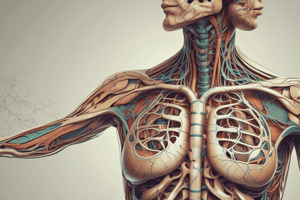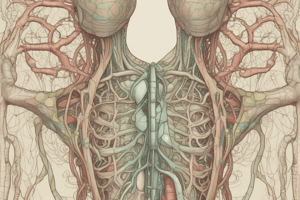Podcast
Questions and Answers
The ______ is the largest lymphoid organ in the body.
The ______ is the largest lymphoid organ in the body.
spleen
The ______ is the only one interposed in blood circulation.
The ______ is the only one interposed in blood circulation.
spleen
The ______ is covered by a capsule which extends to form trabeculae.
The ______ is covered by a capsule which extends to form trabeculae.
spleen
The ______ contains trabecular arteries and veins.
The ______ contains trabecular arteries and veins.
The ______ is an organ that is interposed in blood circulation.
The ______ is an organ that is interposed in blood circulation.
The ______ is the largest organ in the lymphoid system.
The ______ is the largest organ in the lymphoid system.
Trabeculae are formed from the extension of the ______ of the spleen.
Trabeculae are formed from the extension of the ______ of the spleen.
Trabecular arteries and veins are located in the ______ of the spleen.
Trabecular arteries and veins are located in the ______ of the spleen.
The ______ is a structure that extends from the capsule to form trabeculae.
The ______ is a structure that extends from the capsule to form trabeculae.
The ______ is a lymphoid organ that plays a vital role in blood circulation.
The ______ is a lymphoid organ that plays a vital role in blood circulation.
Flashcards are hidden until you start studying
Study Notes
Lymphatic System
- The lymphatic system is a drainage system that assists the venous system by removing larger particles that escape into tissue fluid.
- It reabsorbs excess interstitial fluid and transports dietary lipids.
Components of the Lymphatic System
- Lymph: a clear fluid that flows through the lymphatic vessels
- Lymphatic Vessels:
- Lymphatic capillaries
- Lymphatic vessels
- Lymphatic trunk
- Lymphatic ducts
- Lymphatic Organs:
- Thymus
- Lymph nodes
- Spleen
- Tonsils
- Lymphatic Cells
Lymph Nodes
- Covered by a dense, irregular connective tissue capsule that extends to form trabeculae
- Divided into outer cortex and inner medulla
- Contain lymphoid nodules
Lymphatic Nodules
- Found in lymph nodes and the lamina propria of the intestine
Tonsils
- Palatine tonsils and pharyngeal tonsil
- Covered by stratified, ciliated, columnar epithelium with no crypts
Thymus
- Located in the mediastinum
- Has a connective tissue capsule that penetrates the parenchyma and divides it into incomplete lobules
- Each lobule has:
- Peripheral dark zone called the cortex
- Central light zone called the medulla, containing thymic corpuscles or Hassall corpuscles
- Thymic corpuscles or Hassall corpuscles:
- Characteristic of the thymus, but their function is unknown
- Contain flat epithelial reticular cells arranged concentrically, filled with keratin filaments, and sometimes calcified
Spleen
- The largest lymphoid organ in the body, interposed in blood circulation
- Covered by a capsule that extends to form trabeculae
- Trabeculae contain trabecular arteries and veins
Studying That Suits You
Use AI to generate personalized quizzes and flashcards to suit your learning preferences.




